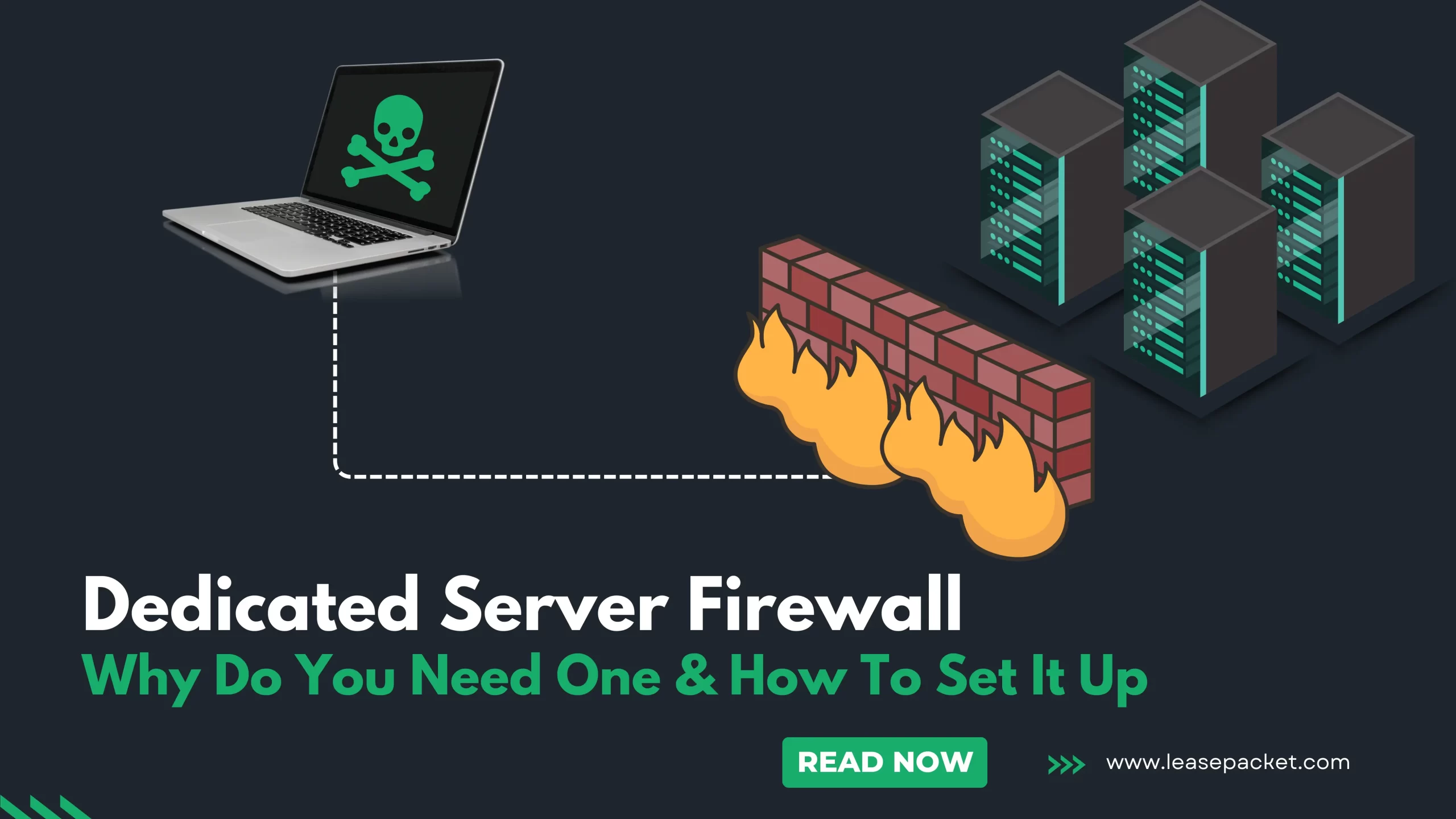Today, news like data breaches & cyber threats are getting increasingly common. Safeguarding your data & server should be your foremost priority, and you must take every possible action to do it. One essential tool by your side is a dedicated server firewall. Let’s dive straight into understanding what a dedicated server firewall is, why you need one & how to set it up. Before moving on to the main course, let’s serve the starter with a brief of a firewall, in general.
Table of Contents
What is a Firewall?
Imagine a firewall as the gatekeeper of your server – monitoring and controlling incoming & outgoing network traffic based on predetermined security rules. It acts as a barrier between your internal network and the expanse of the internet. It analyzes data packets and determines whether they meet the specified criteria. Simply put, a firewall is a shield for your server that prevents unauthorized access & malicious activities.
What is a Dedicated Server Firewall?
A dedicated server firewall is a specialized security solution to safeguard dedicated servers. Unlike shared hosting environments where firewalls are managed by the hosting provider, dedicated server firewalls offer complete control and customization to the server owner. This autonomy enables tailored security configurations aligned with your unique requirements and risk factors.
Why Do You Need a Dedicated Server Firewall?
You do need a firewall for the following benefits.
1. Enhanced Security
Dedicated servers are prime targets for cyber attacks due to their exclusive use by a single entity. A dedicated server firewall adds an extra layer of protection by monitoring incoming & outgoing traffic, blocking potential threats before they reach your server.
2. Compliance Requirements
Regulatory mandates such as GDPR, HIPAA, and PCI DSS necessitate robust security measures to safeguard sensitive data. Implementing a dedicated server firewall fortifies your server and aids in meeting compliance obligations, averting costly penalties & reputational damage.
3. Mitigation of DDoS Attacks
Distributed Denial of Service (DDoS) attacks are a significant threat to online operations – capable enough to disrupt services & cause downtime. A dedicated server firewall can detect and mitigate DDoS attacks in real-time, ensuring the uninterrupted availability of your digital assets.
4. Granular Control
With a dedicated server firewall, you have granular control over inbound & outbound traffic, allowing you to define access policies based on IP addresses, protocols, and ports. This fine-tuned control empowers you to customize security measures according to your needs & preferences.
5. Protection Against Malware
Malicious software, including viruses, worms, and ransomware, can infiltrate your server – compromising data integrity & system functionality. A dedicated server firewall acts as a vigilant sentinel, intercepting & neutralizing malware threats before they cause chaos on your infrastructure.
6. Safe Remote Access
In today’s interconnected world, remote access is crucial for system administration & maintenance tasks. However, remote access also introduces vulnerabilities. By implementing a dedicated server firewall with VPN capabilities, you can establish secure, encrypted connections for remote management and minimize the risk of unauthorized access & data breaches.
How to Set Up a Dedicated Server Firewall?
Setting up a dedicated server firewall involves a combination of technical configuration and strategic planning. Here’s a detailed guide on how to set up a dedicated server firewall, including both conceptual & technical aspects:
Assess Your Security Needs
Identify the potential threats such as unauthorized access, DDoS attacks, or malware infiltration – that you need to defend against. Consider factors like the sensitivity of your data, compliance regulations, and the nature of your server’s use.
Choose a Firewall Solution
Selecting the right firewall solution is crucial. For dedicated servers, you have both software-based and hardware-based options. Software firewalls like iptables (Linux), firewalld (Linux), or Windows Firewall (Windows) provide robust protection. They can also be configured directly on the server. Hardware firewalls, such as those offered by vendors like Cisco or Fortinet, provide network-level protection and are placed between your server and the internet.
Configure Firewall Rules
Once you’ve chosen a firewall solution, it’s time to configure the rules. Firewall rules define who is allowed or blocked based on criteria like source/destination IP addresses, protocols, and ports. For example, you may want to welcome HTTP (port 80) and HTTPS (port 443) traffic while blocking SSH (port 22) access from some IP ranges.
In Linux environments, iptables are a powerful tool for creating firewall rules. You can define rules to allow incoming HTTP traffic using commands like [iptables -A INPUT -p tcp –dport 80 -j ACCEPT]. For more complex setups, tools like firewalld provide a higher-level interface for managing firewall rules.
Implement Advanced Security Measures
Beyond basic firewall rules, consider implementing advanced security measures to enhance protection. Techniques like packet filtering, stateful inspection, and intrusion detection/prevention systems (IDS/IPS) can fortify your server against sophisticated threats.
For example, you can use iptables to set up packet filtering rules to drop packets from suspicious IP addresses or configure firewalld to enable stateful inspection, which tracks the state of network connections to allow only legitimate traffic.
Enable Logging & Monitoring
Logging && monitoring are essential for maintaining visibility into firewall activity and identifying potential security incidents. Enable logging features to record firewall events, such as allowed or denied connections, and configure monitoring tools to analyze firewall logs for anomalies.
In Linux, you can use tools like iptables-logger or firewalld’s built-in logging capabilities to capture firewall events. For centralized log management & analysis, consider integrating with a centralized logging system like syslog or ELK (Elasticsearch, Logstash, Kibana).
Regular Maintenance & Updates
Security is an ongoing process, requiring regular maintenance & updates to stay effective. Keep your firewall software up to date with the latest security patches and firmware updates to address vulnerabilities and enhance protection.
Schedule regular audits and security assessments to review firewall configurations, identify weaknesses, and fine-tune rulesets as needed. Test firewall rules to ensure they are good and functioning as intended and adjust settings based on evolving security requirements.
Conclusion
A dedicated server firewall is vital for your server’s security infrastructure to offer proactive defense against cyber threats. Implement a dedicated server firewall and follow best practices for setup & configuration. This way, you can fortify your server against unauthorized access and other security risks and protect the confidentiality of your digital assets. Prioritize security, stay vigilant, and empower your server with the protection it deserves. You can always connect with top server providers like Leasepacket for a dedicated firewall.
FAQs
Q1. What is a dedicated server firewall?
A dedicated server firewall is a specialized security solution to protect dedicated servers from unauthorized access and cyber threats. It acts as a barrier between the server and the internet, monitoring and controlling network traffic based on predefined security rules.
Q2. Why do I need a dedicated server firewall?
A dedicated server firewall is essential for enhancing security, meeting compliance requirements, mitigating DDoS attacks, enabling granular control over traffic, protecting against malware, and facilitating safe remote access to the server.
Q3. What types of firewall solutions are available for dedicated servers?
You can choose between software-based firewalls like iptables, firewalld, or Windows Firewalls and hardware-based firewalls offered by vendors like Cisco or Fortinet. Software firewalls are configured directly on the server, while hardware firewalls provide network-level protection.
Q4. How do I configure firewall rules?
Firewall rules are configured based on criteria like source/destination IP addresses, protocols, and ports. In Linux environments, tools like iptables or firewalld are used to create and manage firewall rules using command-line or graphical interfaces.
Q5. What advanced security measures can I implement with a dedicated server firewall?
Advanced security measures include packet filtering, stateful inspection, and intrusion detection/prevention systems (IDS/IPS). These measures enhance protection against sophisticated threats by analyzing and filtering network traffic in real time.
Q6. How can I ensure the effectiveness of my dedicated server firewall?
Regular maintenance & updates are crucial for ensuring the effectiveness of your firewall. Keep the firewall software updated with the latest security patches, conduct regular audits and security assessments, and test firewall rules to ensure their health.
Q7. How do I get a dedicated server firewall?
You can connect with top server providers like Leasepacket for a dedicated server firewall.

























